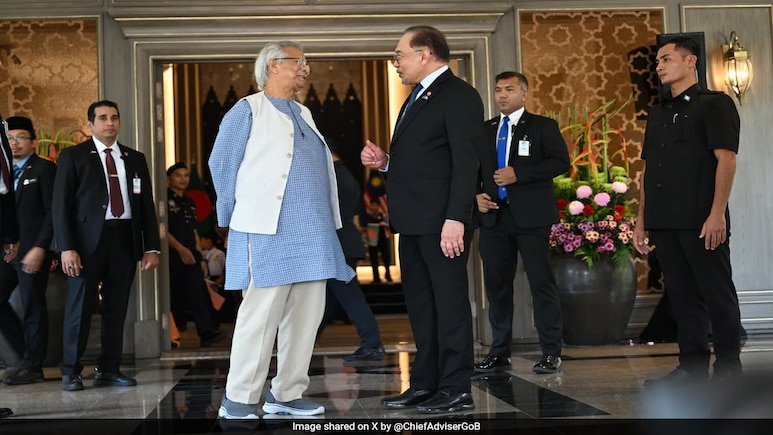
- Bangladesh and Malaysia signed five MoUs and exchanged three notes on cooperation areas
- MoUs covered defence, LNG supply, petroleum, education, and trade sectors
- India banned certain Bangladeshi jute imports through land routes amid strained ties
Bangladesh and Malaysia signed five memoranda of understanding (MoUs) and exchanged three notes in different areas of cooperation-- including defence, trade, and education-- on the first day of Chief Adviser Professor Muhammad Yunus's three-day visit to Malaysia on Tuesday.
During the visit, Bangladesh's Chief Adviser Yunus met Malaysian Prime Minister Anwar Ibrahim, and the two leaders oversaw the signing of agreements in Putrajaya. As Bangladesh's relationship with India continues to deteriorate, Yunus has been focusing on increasing trade with other Southeast Asian nations.
Yunus, who has been criticised for taking multiple foreign trips and making decisions on long-term foreign policy while leading a non-elected interim government with a limited mandate, has recently announced elections in his country.
Pacts Signed With Malaysia
The three notes exchanged during Yunus's visit to Malaysia included topics like cooperation in the field of higher education and training for diplomats, and cooperation in the field of the halal ecosystem.
The five MoUs between Dhaka and Kuala Lumpur were in sectors including defence, Liquefied Natural Gas (LNG) supply and infrastructure, petroleum products, education and trade.
Deteriorating India-Bangladesh Ties
India on Monday banned imports of certain jute products and ropes from Bangladesh through all land routes with immediate effect, amid strained relations between the two countries. With deteriorating trade ties with India, Yunus has been forced to look for avenues to boost trade with other countries.
On May 17, India imposed port restrictions on the import of certain goods like ready-made garments and processed food items from the neighbouring country.
On April 9, India withdrew the transhipment facility it had granted to Bangladesh for exporting various items to the Middle East, Europe and various other countries except Nepal and Bhutan.
These measures were announced against the backdrop of the controversial statements on India's northeast, made by the head of Bangladesh's interim government, Muhammad Yunus, in China.
The latest development is important as about 1 per cent of Bangladesh's exports of these products to India currently use the sea route, and the rest are imported via land ports. Traders in Bangladesh are urging the interim government to engage in dialogue with India to prevent losses.
India has had dumping concerns and earlier had imposed an anti-dumping duty on jute products from Bangladesh, but raw jute imports from Bangladesh were kept outside the purview of the anti-dumping duty. Besides, due to large jute imports, the prices of domestic jute have fallen in India.
Figures from the Export Promotion Bureau (EPB) of Bangladesh show that Bangladesh exported goods worth $1.57 billion to India in the financial year 2023-24, which accounted for 3.75 per cent of the nation's total export earnings.
Track Latest News Live on NDTV.com and get news updates from India and around the world

